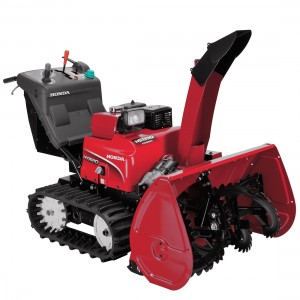 The best way to maximize the long-term value of a Honda HS1335i snow blower is to complete routine maintenance that will keep each of its parts in excellent condition. Honda’s instruction manual provides a comprehensive look at suggested maintenance intervals and the steps to complete each major task, but many equipment owners can also benefit from a few helpful tips as they perform maintenance throughout the winter. From first-time snow blower owners to seasoned professionals, there are a few key pieces of information that can make snow blower ownership easier and more enjoyable over the long-term.
The best way to maximize the long-term value of a Honda HS1335i snow blower is to complete routine maintenance that will keep each of its parts in excellent condition. Honda’s instruction manual provides a comprehensive look at suggested maintenance intervals and the steps to complete each major task, but many equipment owners can also benefit from a few helpful tips as they perform maintenance throughout the winter. From first-time snow blower owners to seasoned professionals, there are a few key pieces of information that can make snow blower ownership easier and more enjoyable over the long-term.Honda takes the guesswork out of routine snow blower maintenance. The company’s HS1335i instruction manual features a maintenance schedule that breaks down required tasks by the hour, season, or other considerations. Typically, the maintenance schedule suggests required work after 20, 100 and 300 hours of use. Some tasks must be performed once per season, while others must be performed every four years. When performing each of these key tasks, equipment owners should keep a few things in mind.
Checking or Changing Fuel and Oil
The most common maintenance task facing snow blower owners is probably filling the gas tank, but oil checks and changes come in at a close second place. Honda recommends filling the fuel tank before each use. For optimal performance, gasoline with an octane of at least 86 should be used in the HS1335i model. Honda also strictly cautions against using diesel fuel or high-ethanol fuels with a concentration above 10 percent.
Oil should be changed after the first 20 hours of operation if the snow blower is new. For older models, Honda’s maintenance schedule requires a full oil change each year when the snow blower is removed from off-season storage. A 5W-30 oil blend is required to ensure excellent performance in frigid conditions. The oil level should be checked before each use, and oil should be added as needed to keep the engine in great condition.
Checking and Adjusting the Spark Plug
The spark plug should be adjusted at least once per season, typically either immediately before or after seasonal storage. If the snow blower is used more frequently during a particularly harsh winter, it’s generally a good idea to check and adjust the spark plug monthly. The spark plug should be cleaned with a stiff brush when the equipment is removed from storage. If spark plug inspection ever reveals signs of significant wear or damage, a full replacement should take place immediately. Honda recommends going no more than four years between spark plug replacements regardless of wear or damage.
Auger and Blower Inspection
The auger and blower should be inspected each year after the snow blower is removed from storage. Additionally, the shear bolts located within the auger housing should be inspected before each use. If either the auger or blower shows any signs of damage, repairs should be completed prior to operation. Damaged shear bolts can be replaced using the wrenches and replacement bolts found in the included tool kit.
Auger Replacement Tips
Auger replacement is a relatively infrequent requirement for HS1335i owners, but excessive wear over many seasons of snow clearing may leave no other option. If the auger shows significant signs of wear, indicated by a reduced depth in the cutouts between each point on the auger blade, the part must be removed and replaced. An authorized Honda service professional should perform this task.
Battery and Fuse Maintenance
Snow blowers that are used frequently will actually charge the included battery while the engine runs. If the snow blower is used only sparingly, however, the battery may not get a full charge. To solve this problem, simply connect the Honda battery charging cable and charge the battery monthly. This will keep it in a state of good repair.
Fuses only need to be inspected and removed if they fail. Should a fuse fail to function, simply remove it from the snow blower and replace it with an OEM Honda fuse. The tool kit bundled with the snow blower contains at least one replacement fuse that should make this a relatively quick process.
Visit HondaLawnParts.com to Find OEM Parts for the HS1335i Snow Blower
Routine maintenance is the best way to keep a snow blower in great condition for many years to come, and HondaLawnParts.com will help make maintenance even easier. Thanks to an online parts search tool that offers only OEM replacements, equipment owners can quickly and easily find the right part for any maintenance need or seasonal repair. Manufactured according to Honda’s standards, these parts will withstand even the harshest winter conditions each year.
